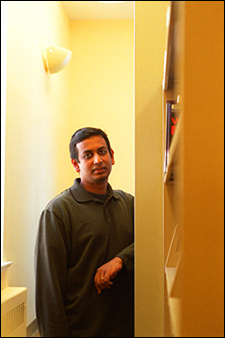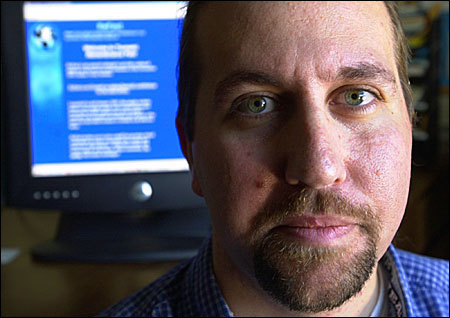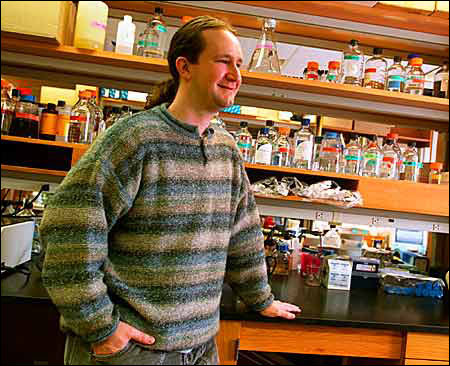Harvard community responds to tsunami
With money, music, medical supplies, and more

The Harvard community responded to the tsunami disaster with grand gestures – as well as very personal ones. Numerous faculty members lent their expertise to the media and to policy-makers. The effort has drawn an as yet unknown number of students and faculty members to the region, including Harvard Medical School Professor of Medical Anthropology Byron Good and Professor of Social Medicine Mary Jo DelVecchio Good, who traveled to Indonesia to help colleagues in a Javanese medical school. Students and student groups from around the University, including the Harvard South Asian Association, organized memorial services and mounted fund drives.
Here are the stories of just five of many Harvard individuals who found unique ways to respond to the tragedy. While their efforts are diverse, their motivation was the same: All met their own feelings of helplessness in the face of a disaster so far away by doing something.
For general tsunami information, visit http://www.news-harvard.go-vip.net/gazette/press/pressdoc/pr-050107-tsunami.html
Raising money – fast!
Nayana Mawilmada
Harvard Business School student
Just days after the Dec. 26 tsunami hit his homeland of Sri Lanka, and long before his classmates or professors had returned from the winter break, Harvard Business School (HBS) student Nayana Mawilmada ’05 had sprung into action. He launched an at-first modest e-mail campaign encouraging friends and section-mates to make a donation to a Harvard-specific fund he had set up with the Boston chapter of the America Red Cross; his efforts multiplied as friends forwarded Mawilmada’s appeal to others.
“Within the first week or so we had raised something like $40,000,” he says. Soon, Harvard endorsed the channel he had set up and announced that the University would match student and staff gifts to this account at the American Red Cross.
Mawilmada, who worked at the Asian Development Bank before coming to HBS, drew on his professional expertise to continue to channel energy and money in the most efficient, most necessary ways. He knew that the Red Cross’ services were crucial in the early days of the disaster, but that as weeks went by efforts to rebuild and sustain the devastated areas required a different kind of relief.
So he turned his attention to a Web site called HelpSL.org that matches potential donors of money, time, or in-kind goods and services with the specific needs of international organizations working in Sri Lanka.
Linking those who want to help with those who can deliver assistance is a role for which Mawilmada is uniquely qualified, he says. Not only did his experience at the Asian Development Bank give him valuable perspective, but he’s able to bridge a number of cultural crossroads.
He’s worked to strike a balance between funding Sri Lanka-specific charities and ones like the Red Cross, whose services are distributed throughout the affected areas. And as an ethnic Singhalese married to a Tamil – the two major ethnic groups of Sri Lanka – he’s sensitive to ensuring that any money raised for Sri Lanka goes to organizations that will distribute it across ethnic boundaries.
“I’m reasonably well-informed and reasonably comfortable with the sensitivities of the different groups,” he says. “It puts me in a good position to try to leverage those towards the right channels. If I were just going to one channel, I wouldn’t be able to generate as much money.”
To help: www.helpSL.org
Fasting instead of forgetting
Mike Bishop
Harvard College administrator
Mike Bishop, assistant director of the Public Service Network at Harvard College, has focused his relief action on not doing something: eating.

On Martin Luther King Jr.’s birthday, he launched a Web site, encouraging people to fast on the anniversary of the tsunami each month for the coming year.
“I’m trying to create a forum for people to come together so that the energy that exists now will not be lost. … I’m hoping that my Web site will help sustain some of the energy around relief efforts.”
Concerned that attention on the ongoing efforts to rebuild tsunami-ravaged areas will fade throughout the year, Bishop turned to the symbolic power of fasting to promote mindfulness. He notes that although his effort is nonsectarian, the practice of fasting is a part of many cultural and spiritual traditions.
While he has no personal connection to the Southeast Asian region most affected by the tsunami, Bishop does have experience with fasting, both as part of a spiritual practice and for political awareness. In college, he helped organize a successful fast protesting the 1993 holding of Haitian refugees in Guantanamo Bay, Cuba.
As he recruits fasters to sign a pledge on his Web site, Bishop is hopeful that they’re motivated to go beyond fasting to take some sort of action, be it making a donation or learning more about the affected region.
“I think that people pausing each month and being mindful of the struggles of survivors … hopefully will raise people’s consciousness of what’s happening there,” he says. “But I think the crucial aspect is what sort of action people take after reflecting on the tragedy.”
To help: www.refast.org
Rebuilding with the sun … one panel at a time
Mark Koyama
Harvard Business School administrator
As a college student in the late 1980s, Mark Koyama spent six months in Sri Lanka as part of the Intercollegiate Sri Lanka Education (ISLE) program. After the tsunami hit, he connected with a fellow ISLE alumnus, anthropologist and Olin College of Engineering professor Caitryn Lynch, to raise funds to send solar panels to several Sri Lankan villages. Their effort, born of a serendipitous connection via Lynch between a Sri Lankan garment industrial who had started Rebuild Sri Lanka and the Washington, D.C.-based Solar Electric Light Fund (SELF), aims to help villages and hospitals rebuild in a sustainable way.

“This is an incredible catastrophe, but looked at in the right way, perhaps an opportunity,” says Koyama, a technical support analyst at Harvard Business School who’s brought his Web site expertise to the project. “This is an opportunity to bring in a renewable, clean source of energy to these areas, one that makes more sense. The sun is there already.”
Koyama adds that Sri Lanka’s power grid is fragile in the best of circumstances, making solar power an even more attractive choice. “Solar has its own autonomy. It has a unique ability to address some of these problems.”
Like several others mounting relief efforts, Koyama is drawn to the small yet concrete scale of bringing solar power to villages. “This is an effort in which … the effects are tangible,” he says. “We’ll be able to see that we made a difference.”
To help: www.rebuildsrilankasolar.org
Medical supplies from Longwood to Sri Lanka
Jonathan Swoboda
Chemistry student, Graduate School of Arts and Sciences
For Jonathan Swoboda, a graduate student in chemistry who works in the research laboratory of Suzanne Walker, professor of microbiology and molecular genetics, responses to the devastation of the tsunami were all around him in the Longwood Medical Area.

“I felt like a lot of people were asking for money. We wanted to give people another outlet to donate,” says Swoboda. So with a friend, Sri Lanka native and Dana-Farber Cancer Institute researcher Sohanya Welikala, he began collecting medical supplies to distribute to Sri Lanka. Local suppliers and hospitals, Brigham and Women’s and Dana-Farber among them, have contributed overstock or about-to-expire medicines and supplies such as bandages and latex gloves.
While hospitals have been generous and Sri Lankan Airlines has donated cargo space for the transportation of supplies, “one of the biggest problems right now is distribution,” says Swoboda. He and Welikala have tapped her father’s networks – he’s the former head of the Sri Lanka Chamber of Commerce – to ensure that the donated supplies reach those most in need.
As with several others undertaking individual, more focused donation campaigns, Swoboda has been underwhelmed at the response he’s gotten. He suspects that a sort of charity fatigue is setting in as news of the tsunami wanes and larger relief organizations captured peoples’ attention – and dollars – early on.
“It’s not as big as what we’d like it to be,” he says of his effort to collect medical supplies, “but what we’ve done so far has been quite significant. Anything we do helps.”
To help: swoboda@fas.harvard.edu
HMS instructor launches CD effort
Brian Cobb
Harvard Medical School instructor
When he learned of Harvard’s offer to match student and employee contributions to tsunami relief efforts, Harvard Medical School instructor Brian Cobb was ready to write a check. Then he wondered if, instead of giving $100, he might be able to make a larger donation with a little help from his friends.

So Cobb, an immunology researcher who’s also a songwriter, electric bass player, and vocalist, decided to launch a compilation CD and funnel all sales to the American Red Cross. With musical compatriot Barry Thompson, Cobb tapped the online community of followers of one of their favorite progressive rock bands, Spock’s Beard. The duo has been overwhelmed by the response of artists willing to donate a song to The Tsunami Project.
“It’s ballooned almost out of proportion,” says Cobb, adding that it’s now a double CD set.
Rick Wakeman, keyboardist of the band Yes, is the CD’s biggest name; other contributors are signed artists or talented amateurs from around the United States and the world, says Cobb. He and Thompson plan to press 200 CDs, funded with their own money and donations from friends, and sell them at $15 each via a Web site. If they sell all 200 CDs, of which Cobb is fairly confident, they’ll send $3,000 to the American Red Cross’s tsunami relief efforts.
Cobb has no personal connection to tsunami-ravaged areas but was nonetheless moved to action by the disaster. “The scale of this is so incredible … that every little bit will help,” he says. “This seemed like the least we could do. We’ve got music sitting around, and the CD gives people a reason to give beyond just being philanthropic.”
To help: www.digitalchemistrymusic.com/the-tsunami-project/index.html




